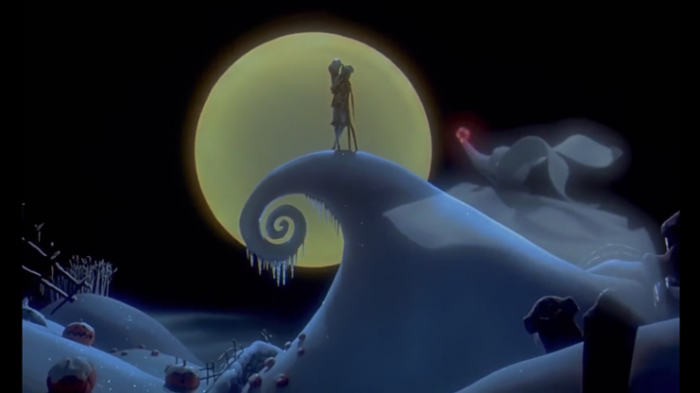What's This? A Queer Reading Of 'The Nightmare Before Christmas'
(Welcome to Queering the Scene, a series that explores LGBTQ themes and content in films of all kinds...especially where you least expect it.) The Nightmare Before Christmas has been the source of great debate and contention for decades. In the 26 years since its release, it's ruined friendships, torn families asunder, and stoked the flames of sibling rivalries across the globe over this one conundrum: is it a Christmas or Halloween film? I know. I'm sure you remember the very first fight you had about this exact issue. Both sides battling one over the other. Eventually, the wars would subside, both sides lamentably agreeing that it could be both, I guess. And so, on this auspicious occasion, as we celebrate one of the two holidays this film is decidedly about, I thought I'd throw a wrench into the whole machine and postulate the following: The Nightmare Before Christmas is a perfect allegory for the struggle bisexual, pansexual, and queer people feel while straddling two worlds, or several, depending on how you interact with the gender pantheon.Yup, that's right folks. In this edition of Queering The Scene, Jack Skellington is queer AF, and his journey is more than just an experiment with different holidays – it's an experiment in sexuality and expanding his consciousness beyond the exnominated factor of heteronormativity. For those of you who may be new to this column let me set you up with some basic information. The term queering is an academic one literally meaning to perform a queer reading of something. It can be a book, song, film, television show – whatever your little heart desires. It does not propose that the text being read is actually (and only) the way the queer reading paints it. Rather, it merely suggests that there can be many different ways of reading certain texts, one of which being through a queer lens. That's the basis of this column – to perform a queer reading of movies, both popular and obscure, in all genres, in order to present an alternative way of thinking about film. It's fun, playful conjecture that's meant to open minds, broaden horizons, and get folks thinking outside their bubble. It's also not for everyone, but who am I to judge?Onto the Christmalloween queerness! The Nightmare Before Christmas, for those who may be unfamiliar, is the story of Jack Skellington AKA The Pumpkin King. He exists in a reality where each holiday has its own world, and Jack is the ruler of Halloween Town. Seemingly happy with his peaceful existence scaring the crap out of small children once a year, he goes through the motions, accepting praise from the adoring townsfolk and planning the next year's festivities. That is until he finds Christmas Town, where he learns that there are more holidays to celebrate than just Halloween. He decides it's time for a change, which means taking a misguided stab at Christmas instead. Naturally, calamity ensues. This film is a classic, beloved by generations of monster kids and their parents. I defy anyone who grew up watching this film on repeat not to sing along to literally any song on the soundtrack. We all know it, inside and out, as the story of a man who's in the midst of an identity crisis. Well, as a little girl I always saw him as struggling with something deeper, something ineffable that he couldn't quite put his finger on: his sexuality. Yes, as a little girl I thought about these things, and you want to know why? Because I was struggling with them myself. But more on that later.The film starts off with its infectious opening musical number dedicated to Halloween Town, which is all Jack's ever known. Performing for everyone is all he's ever had to succeed at and, as a result, he got damn good at it, in more ways than one. 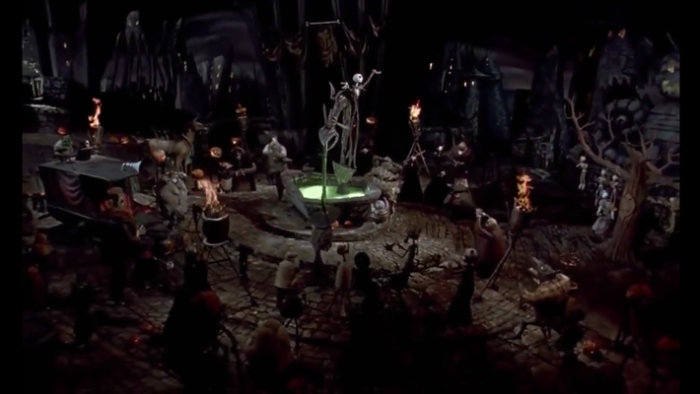 But by this point in his life, after presumably centuries of doing this, he's started to just go through the motions. He literally has to be dragged into town by someone else in order to do his job. He still delivers, and everyone's thrilled. But what they see as a showy gimmick is actually just a symbol of his exhaustion from hiding not only in plain sight but from himself.
But by this point in his life, after presumably centuries of doing this, he's started to just go through the motions. He literally has to be dragged into town by someone else in order to do his job. He still delivers, and everyone's thrilled. But what they see as a showy gimmick is actually just a symbol of his exhaustion from hiding not only in plain sight but from himself. 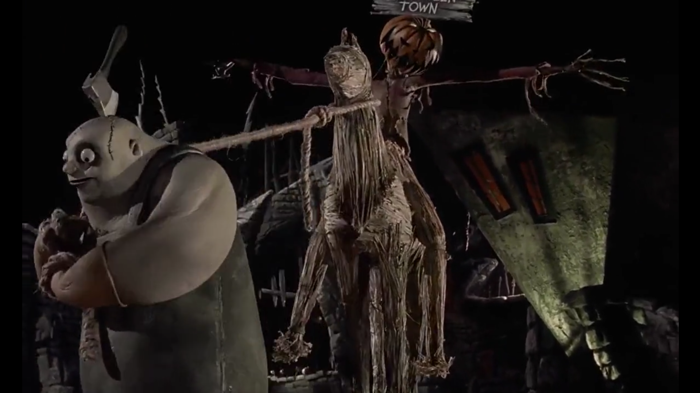 All of this pressure is made infinitely worse by the fact that he's universally beloved. Kids look up to him (literally), and women throw themselves at his feet (also literally).
All of this pressure is made infinitely worse by the fact that he's universally beloved. Kids look up to him (literally), and women throw themselves at his feet (also literally). 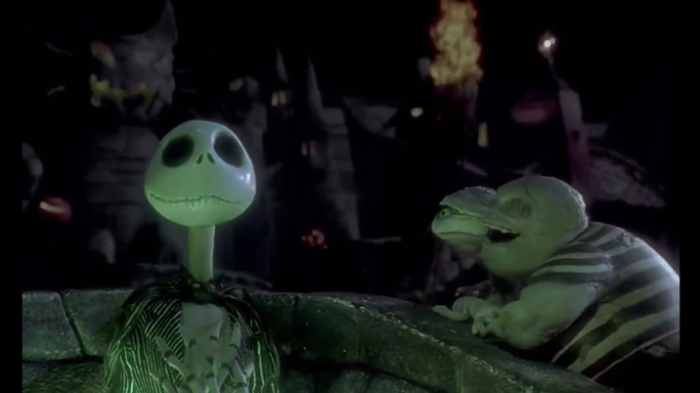
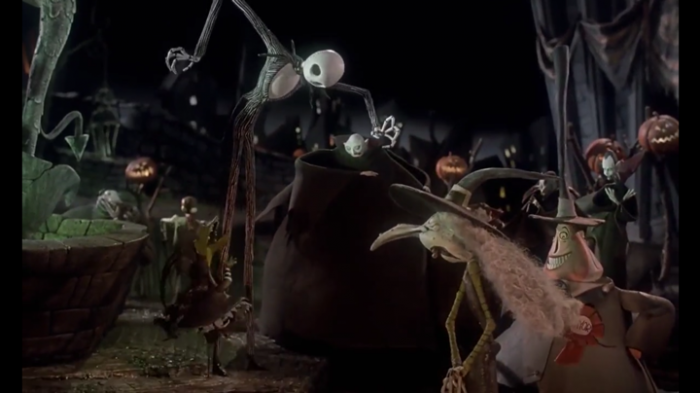
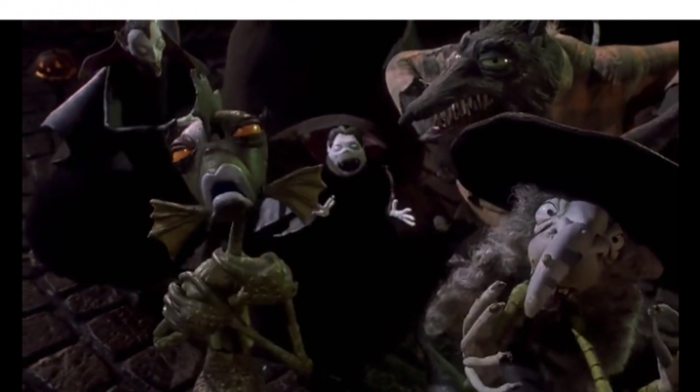 He has everything he's supposed to want, so why isn't he happy? "Nice work, Bone Daddy," a skeletal jazz saxophonist skats at him as he skulks out of town. "Yeah, I guess so," he answers, moping, "Just like last year. And the year before that. And the year before that."
He has everything he's supposed to want, so why isn't he happy? "Nice work, Bone Daddy," a skeletal jazz saxophonist skats at him as he skulks out of town. "Yeah, I guess so," he answers, moping, "Just like last year. And the year before that. And the year before that." 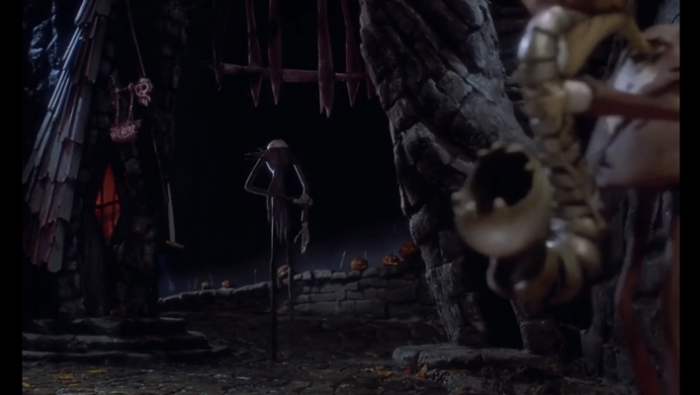 Even he doesn't get it, as the lyrics to "Jack's Lament" prove:Oh, somewhere deep inside of these bonesAn emptiness began to growThere's something out there, far from my homeA longing that I've never knownJack sings, or rather laments, that he's just so damn good at being the Skeleton King – or Mr. Unlucky to that guy in Kentucky. Even he sees himself as fitting the bill as the perfect scaremaestro, which only adds to his confusion. Everyone else loves Halloween. No one else seems to want to experiment with anyone anything else. The problem here is that Jack thinks Halloween Town and, as a result, Halloween, are the only options he has at life. And the reason he thinks this is because Halloween Town, presented here as an allegory for heteronormativity, is the exnominated factor. It's the only thing he's ever known, therefore making it omnipresent, so much so that it becomes invisible, an oppressive lone option at identity. You may be scratching your heads right now, so let me explain. The theory of exnomination roots back to Roland Barthes' book Mythologies from 1957. This invaluable tome uses a series of essays to argue that contemporary social value systems create modern myths, and that these myths can prove to be oppressive. The term exnomination, according to Barthes, suggests that something is beyond naming. He used it to describe how the Bourgeoisie hid its name and, consequently, its identity simply by not referring to itself as such. This naturalized bourgeois ideology, strengthening and maintaining its power over society. Basically, exnominated factors are the power structures we don't tend to see such as whiteness, maleness, and heteronormativity. It's a term often used in cultural studies to discuss societal power struggles. Let me give you a really simple example. Jack went out for coffee with Bill. What if I were to tell you that Jack was a lesbian, and Bill was her brother. Without mentioning these added factors, you'd likely just as soon assume Jack and Bill were just two white dudes. You'd make that assumption because whiteness, maleness, and heteronormativity are all exnominated factors. They are the immediate association we make when we're not presented with extra details for the precise reason that those details are only necessary to establish otherness. This only further elevates the power of the exnominated factors, thereby creating a cyclical problem that seems inescapable. It's a lot.
Even he doesn't get it, as the lyrics to "Jack's Lament" prove:Oh, somewhere deep inside of these bonesAn emptiness began to growThere's something out there, far from my homeA longing that I've never knownJack sings, or rather laments, that he's just so damn good at being the Skeleton King – or Mr. Unlucky to that guy in Kentucky. Even he sees himself as fitting the bill as the perfect scaremaestro, which only adds to his confusion. Everyone else loves Halloween. No one else seems to want to experiment with anyone anything else. The problem here is that Jack thinks Halloween Town and, as a result, Halloween, are the only options he has at life. And the reason he thinks this is because Halloween Town, presented here as an allegory for heteronormativity, is the exnominated factor. It's the only thing he's ever known, therefore making it omnipresent, so much so that it becomes invisible, an oppressive lone option at identity. You may be scratching your heads right now, so let me explain. The theory of exnomination roots back to Roland Barthes' book Mythologies from 1957. This invaluable tome uses a series of essays to argue that contemporary social value systems create modern myths, and that these myths can prove to be oppressive. The term exnomination, according to Barthes, suggests that something is beyond naming. He used it to describe how the Bourgeoisie hid its name and, consequently, its identity simply by not referring to itself as such. This naturalized bourgeois ideology, strengthening and maintaining its power over society. Basically, exnominated factors are the power structures we don't tend to see such as whiteness, maleness, and heteronormativity. It's a term often used in cultural studies to discuss societal power struggles. Let me give you a really simple example. Jack went out for coffee with Bill. What if I were to tell you that Jack was a lesbian, and Bill was her brother. Without mentioning these added factors, you'd likely just as soon assume Jack and Bill were just two white dudes. You'd make that assumption because whiteness, maleness, and heteronormativity are all exnominated factors. They are the immediate association we make when we're not presented with extra details for the precise reason that those details are only necessary to establish otherness. This only further elevates the power of the exnominated factors, thereby creating a cyclical problem that seems inescapable. It's a lot.  So Jack is living in a place where he's constantly surrounded by exnomination, while he is the Other. But because he doesn't really know Sally, arguably the only other Other in town who actually gets him, he's drowning in a sea of exnomination. Halloween Town and heteronormativity is all there is, and so it's all he can be. Or so he thinks. He learns just how much more there is to life by accidentally stumbling on another world – Christmas Town.
So Jack is living in a place where he's constantly surrounded by exnomination, while he is the Other. But because he doesn't really know Sally, arguably the only other Other in town who actually gets him, he's drowning in a sea of exnomination. Halloween Town and heteronormativity is all there is, and so it's all he can be. Or so he thinks. He learns just how much more there is to life by accidentally stumbling on another world – Christmas Town.  Enter yet another song that you, dear reader, most definitely know by heart – "What's This?" Jack spends the duration elated by the presence of something not only different and enticing but that provides him with a sense of joy he's never experienced before. This is the Other. This is everything he's been missing, and what he never knew existed.
Enter yet another song that you, dear reader, most definitely know by heart – "What's This?" Jack spends the duration elated by the presence of something not only different and enticing but that provides him with a sense of joy he's never experienced before. This is the Other. This is everything he's been missing, and what he never knew existed.  What's this? What's this?There's something very wrongWhat's this?There are people singing songsWhat's this?The streets are lined withLittle creatures laughingEverybody seems so happyHave I possibly gone daffy?He thinks what he's seeing is wrong. That something is incorrect because of how isolated his worldview has been until now. He didn't know you could have bright colors like this, or that people could sing in the streets about happy things that didn't involve ghosts and ghouls.
What's this? What's this?There's something very wrongWhat's this?There are people singing songsWhat's this?The streets are lined withLittle creatures laughingEverybody seems so happyHave I possibly gone daffy?He thinks what he's seeing is wrong. That something is incorrect because of how isolated his worldview has been until now. He didn't know you could have bright colors like this, or that people could sing in the streets about happy things that didn't involve ghosts and ghouls.  There's frost on every windowOh, I can't believe my eyesAnd in my bones I feel the warmthThat's coming from inside...The sights, the soundsThey're everywhere and all aroundI've never felt so good beforeThis empty place inside of me is filling upI simply cannot get enoughI want it, oh, I want itOh, I want it for my ownIn all of his haste, his introduction to Christmas Town (the queer community, in this reading) is overwhelming. He ultimately goes haywire in the opposite direction. Suddenly, Christmas Town is one of only two options available, and since Halloween Town no longer feels right, that means this new world must be the answer to all his woes. He spends the rest of the film bastardizing that world because, ultimately, it isn't the right fit.
There's frost on every windowOh, I can't believe my eyesAnd in my bones I feel the warmthThat's coming from inside...The sights, the soundsThey're everywhere and all aroundI've never felt so good beforeThis empty place inside of me is filling upI simply cannot get enoughI want it, oh, I want itOh, I want it for my ownIn all of his haste, his introduction to Christmas Town (the queer community, in this reading) is overwhelming. He ultimately goes haywire in the opposite direction. Suddenly, Christmas Town is one of only two options available, and since Halloween Town no longer feels right, that means this new world must be the answer to all his woes. He spends the rest of the film bastardizing that world because, ultimately, it isn't the right fit.  The added problem is that no one else – other than Sally – can really understand what he's getting at. Jack spends the entirety of "Town Meeting Song" desperately trying to explain the appeal of this completely incomprehensible world to the rest of the townsfolk, who just don't get it. He's explaining the otherness he feels at his core, but that otherness is something he still doesn't really get. And so, in the midst of desperately trying to teach them what else there can be, he caves and gives them what they want. And the best, I must confess, I have saved for the lastFor the ruler of this Christmas landIs a fearsome king with a deep mighty voiceLeast that's what I've come to understand
The added problem is that no one else – other than Sally – can really understand what he's getting at. Jack spends the entirety of "Town Meeting Song" desperately trying to explain the appeal of this completely incomprehensible world to the rest of the townsfolk, who just don't get it. He's explaining the otherness he feels at his core, but that otherness is something he still doesn't really get. And so, in the midst of desperately trying to teach them what else there can be, he caves and gives them what they want. And the best, I must confess, I have saved for the lastFor the ruler of this Christmas landIs a fearsome king with a deep mighty voiceLeast that's what I've come to understand He caves, and caters to what they can comprehend, ultimately to his own detriment. Well, at least they're excitedThough they don't understandThat special kind of feeling in Christmas landOh, well...Remember when I said I'd come back to that part of my childhood? Yeah, it's time. When I was a kid, I never understood why I seemed to see people differently. I had funny feelings towards the girls who were mean to me, and only occasionally felt those same things towards boys. I was already teased relentlessly, so I just kept all of that to myself. "Just be yourself," my mom would tell me when I'd come home from school crying. The problem was, I had no idea what that meant. How can you be yourself when you don't know who you are, or why you feel so completely different from everyone else? This would go on well into my teen years, where I struggled much like Jack does to find the place that felt right within myself. I never did. Well, not then at least. You see, as far as my limited knowledge of the world allowed, sexuality seemed to be a binary – you were either gay or you were straight. There were no other options. So when I didn't feel at home in either place, I became profoundly depressed. The only time I tried telling someone at that age, my boyfriend at the time, they tried to force me to watch lesbian porn and tell them how it made me feel. Somehow, this would confirm to them and me that I was gay and we should break up. I'm not being hyperbolic when I say it scarred me for life. I didn't bring it up again until I was an adult, nearly out of my 20s, and even then I was misunderstood. You see, all my life I've been Jack, standing in front of a crowded room begging people to understand that there's something else besides the limited scope of our personal world view and the exnominated factors that come with it. That something else, at least for me, was my own pansexuality, a term that took me nearly 30 years to learn. And the second that I did, it was like I was standing atop my very own spiral mountain, high above the world I'd always known but seeing it with fresh eyes. Jack is the embodiment of that experience – of trying to wrap your head around yourself, much like many of us have, in order to feel at home in your own skin.
He caves, and caters to what they can comprehend, ultimately to his own detriment. Well, at least they're excitedThough they don't understandThat special kind of feeling in Christmas landOh, well...Remember when I said I'd come back to that part of my childhood? Yeah, it's time. When I was a kid, I never understood why I seemed to see people differently. I had funny feelings towards the girls who were mean to me, and only occasionally felt those same things towards boys. I was already teased relentlessly, so I just kept all of that to myself. "Just be yourself," my mom would tell me when I'd come home from school crying. The problem was, I had no idea what that meant. How can you be yourself when you don't know who you are, or why you feel so completely different from everyone else? This would go on well into my teen years, where I struggled much like Jack does to find the place that felt right within myself. I never did. Well, not then at least. You see, as far as my limited knowledge of the world allowed, sexuality seemed to be a binary – you were either gay or you were straight. There were no other options. So when I didn't feel at home in either place, I became profoundly depressed. The only time I tried telling someone at that age, my boyfriend at the time, they tried to force me to watch lesbian porn and tell them how it made me feel. Somehow, this would confirm to them and me that I was gay and we should break up. I'm not being hyperbolic when I say it scarred me for life. I didn't bring it up again until I was an adult, nearly out of my 20s, and even then I was misunderstood. You see, all my life I've been Jack, standing in front of a crowded room begging people to understand that there's something else besides the limited scope of our personal world view and the exnominated factors that come with it. That something else, at least for me, was my own pansexuality, a term that took me nearly 30 years to learn. And the second that I did, it was like I was standing atop my very own spiral mountain, high above the world I'd always known but seeing it with fresh eyes. Jack is the embodiment of that experience – of trying to wrap your head around yourself, much like many of us have, in order to feel at home in your own skin.